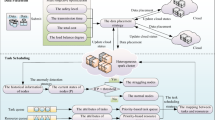Abstract
In order to improve the ability of resource allocation and scheduling in cloud computing, optimize resource allocation and improve the efficiency of cloud computing, an optimal computing resource allocation algorithm in cloud computing based on hybrid differential parallel scheduling is proposed. In this algorithm, the models of data structure and gird structure of computing resource allocation in cloud computing are constructed, and the sample clustering analysis method of resource information flow is used to classify the attributes of computing resources; the sliding window of computing resource allocation is divided into multiple sub-windows; characteristic quantities associated with computing resource allocation attributes are selected in neighbor samples as standard vector sets for adaptive pairing; the computing resources in cloud computing are done with singular value decomposition and the resource allocation is transformed into the least square problem; the hybrid differential parallel computing method is used for optimal solution finding of resource scheduling vector set to prevent the allocation results from falling into local optimal solution, so as to improve the global convergence of resource allocation. The simulation results show that when the method proposed in this paper is used for resource allocation in clouding computing, the clustering performance is high and the convergence control ability to computing resources with different attributes is high; the allocation speedup can reach 3.67, which is improved by 14.65 and 7.43% respectively compared with that in the traditional HEFT algorithm and HCNF algorithm; when the number of allocate nodes is 100, the overhead is only 5.6, which is reduced by 14.56 and 8.33% than that in traditional HEFT algorithm and HCNF algorithm. So it shows that the proposed method has a higher practical application performance for its shorter execution time and lower overhead.





Similar content being viewed by others
References
Bi, A.Q., Wang, S.T.: Transfer affinity propagation clustering algorithm based on Kullback-Leiber distance. JEIT 38(8), 2076–2084 (2016)
Alahmad, B.N., Gopalakrishnan, S.: Energy efficient task partitioning and real-time scheduling on heterogeneous multiprocessor platforms with QoS requirements. Sustain. Comput. 1(4), 314–328 (2011)
Chillet, D., Eiche, A., Pillement, S., et al.: Real-time scheduling on heterogeneous system-on-chip architectures using an optimised artificial neural network. J. Syst. Archit. 57(4), 340–353 (2011)
Guo, X.Y.: Simulation and analysis on uncertain attenuation property of underwater acoustic signal for oil field pipe. Comput. Simul. 31(3), 118–121 (2014)
Femando, N., Hong, Y., Viterbo, E.: Flip-OFDM for unipolar communication systems. IEEE Trans. Commun. 60(12), 3726–3733 (2012)
Patricia, N., Caputo, B.: Learning to learn, from transfer learning to domain adaptation: a unifying perspective. In: Proceedings of the IEEE Conference on Computer Vision and Pattern Recognition, Columbus, OH, USA, pp. 1442–1449 (2014)
Wang, Z., Su, X.: Dynamically hierarchical resource-allocation algorithm in cloud computing environment. J. Supercomput. 71(7), 2748–2766 (2015)
Sun, L., Guo, C.H.: Incremental affinity propagation clustering based on message passing. IEEE Trans. Knowl. Data Eng. 26(11), 2731–2744 (2014)
Ling, C.G., Wang, H.Z.: Optimization research on differential evolution algorithm and its application in clustering analysis. Modern Electron. Technol. 39(13), 103–107 (2016)
Li, M.D., Zhao, H., Weng, X.W., et al.: Differential evolution based on optimal Gaussian random walk and individual selection strategies. Control Decis. 31(08), 1379–1386 (2016)
Patel, V.M., Nguyen, H.V.: VIDAL R.: latent space sparse and low-rank subspace clustering. IEEE J. Sel. Top. Signal Process. 9(4), 691–701 (2015)
Sun, L.J., Chen, X.D., Han, C., et al.: New fuzzy-clustering algorithm for data stream. JEIT 37(7), 1620–1625 (2015)
Bi, A.Q., Dong, A.M., Wang, S.T.: A dynamic data stream clustering algorithm based on probability and exemplar. J. Comput. Res. Dev. 53(5), 1029–1042 (2016)
Jiang, Y.Z., Chung, F.L., Wang, S.T., et al.: Collaborative fuzzy clustering from multiple weighted views. IEEE Trans. Cybern. 45(4), 688–701 (2015)
Wang, W.B.: Simulation of cloud computing resource optimization scheduling under the interference of debris resources. Comput. Simul. 33(7), 65–71 (2016)
Dai, L., Li, J.H.: An optimal resource allocation algorithm in cloud computing environment. Appl. Mech. Mater. 733(23), 779–783 (2015)
Hu, W., Li, K., Xu, J., et al.: Cloud-computing-based resource allocation research on the perspective of improved ant colony algorithm. In: IEEE International Conference on Computer Science and Mechanical Automation, pp. 76–80 (2016)
Shao, Y.: Virtual resource allocation based on improved particle swarm optimization in cloud computing environment. Int. J. Grid Distrib. Comput. 8(1), 228–233 (2015)
Liu, Y., Lee, M.J.: An adaptive resource allocation algorithm for partitioned services in mobile cloud computing. In: IEEE Service-Oriented System Engineering, pp. 209–215 (2015)
Author information
Authors and Affiliations
Corresponding author
Rights and permissions
About this article
Cite this article
Wei, J., Zeng, Xf. Optimal computing resource allocation algorithm in cloud computing based on hybrid differential parallel scheduling. Cluster Comput 22 (Suppl 3), 7577–7583 (2019). https://doi.org/10.1007/s10586-018-2138-7
Received:
Revised:
Accepted:
Published:
Issue Date:
DOI: https://doi.org/10.1007/s10586-018-2138-7




